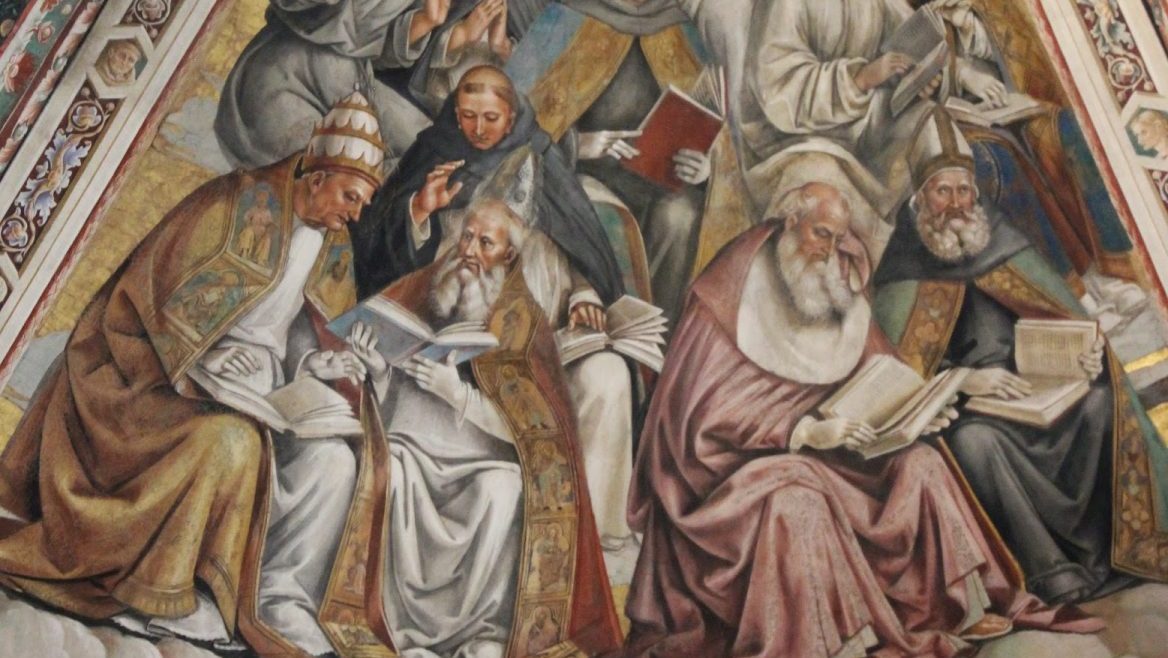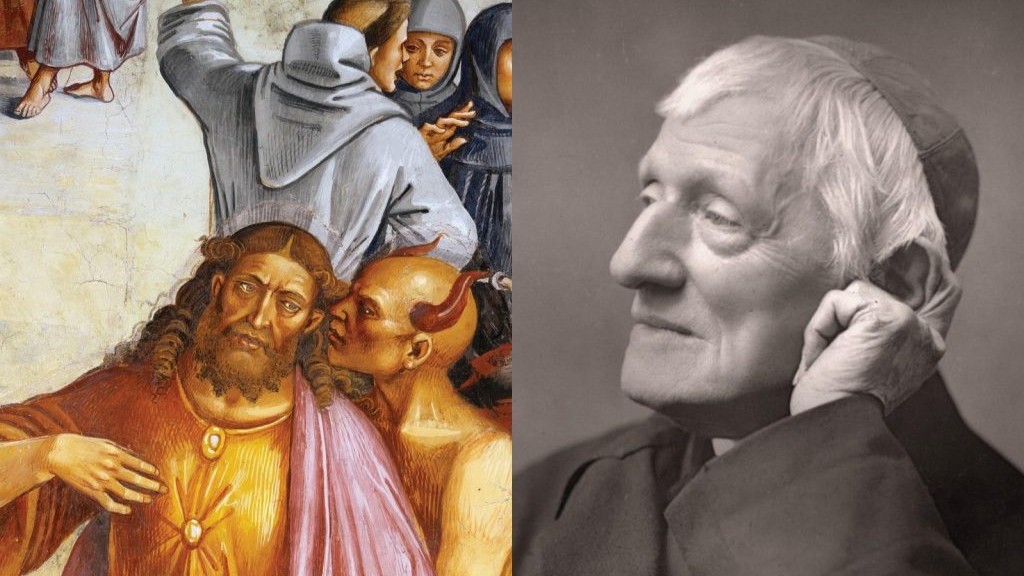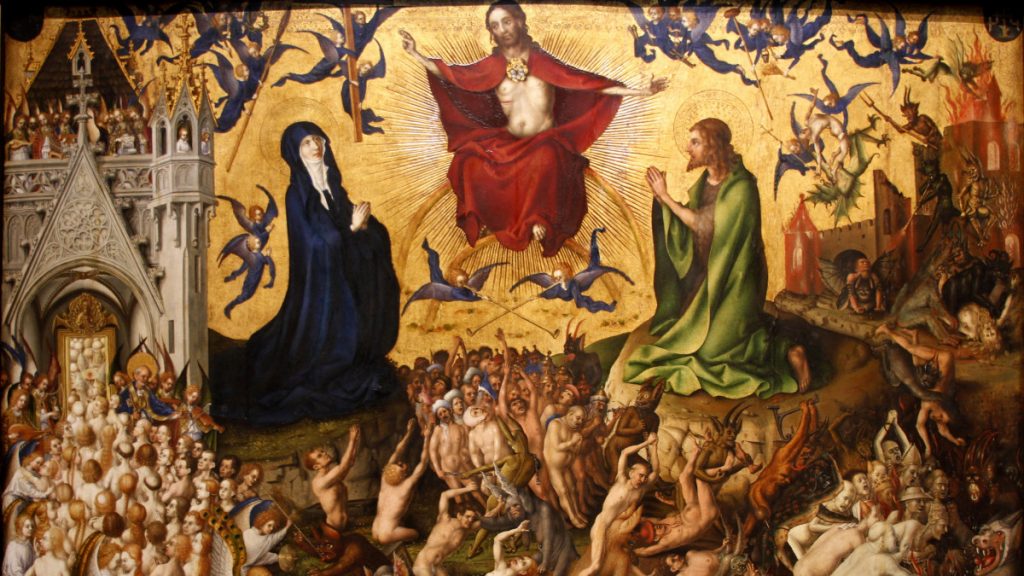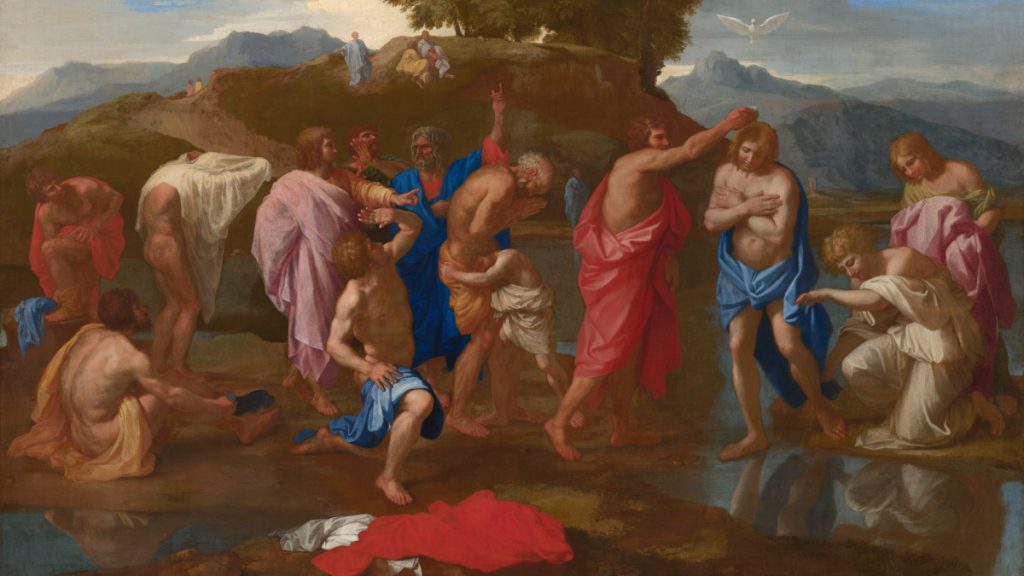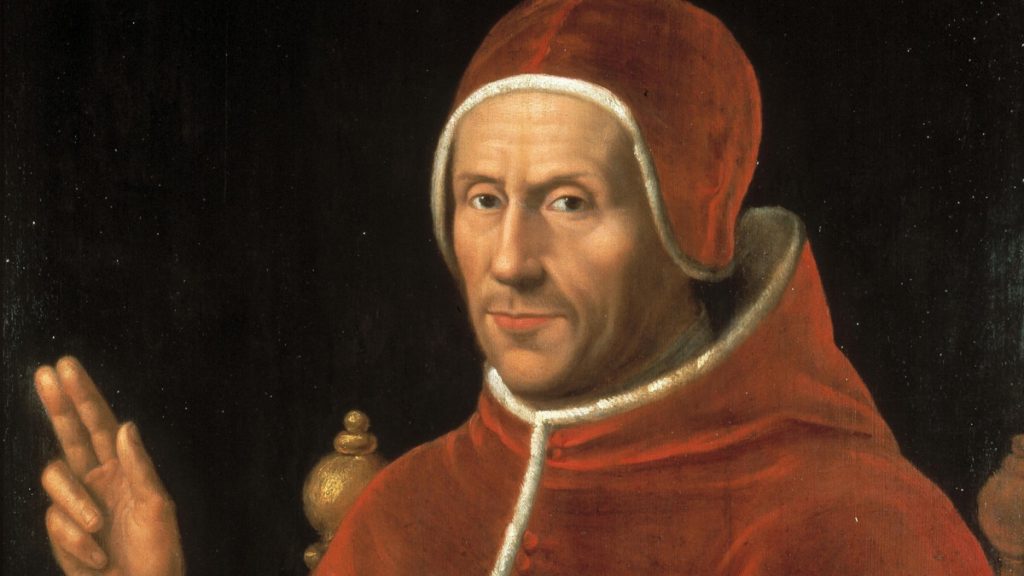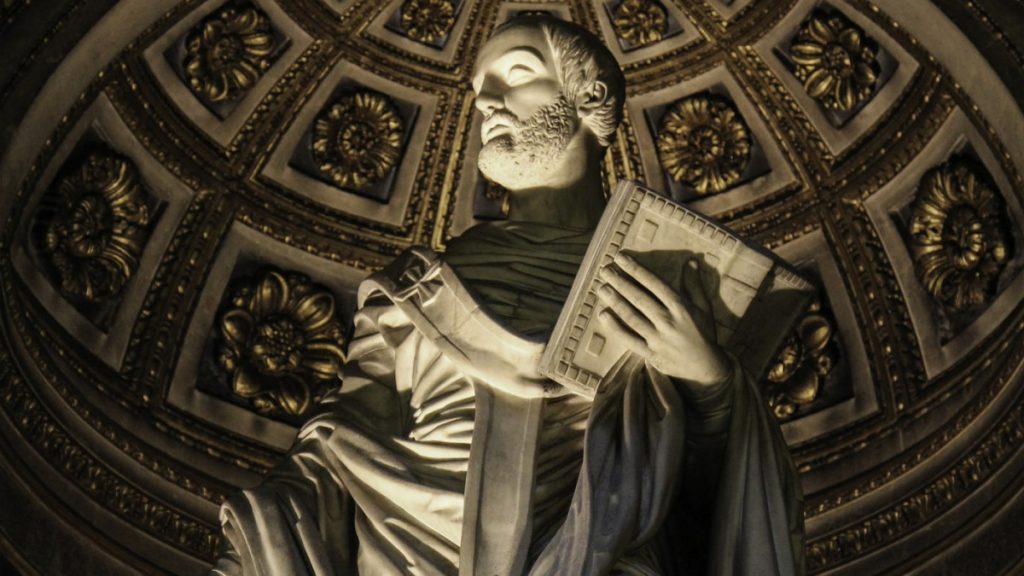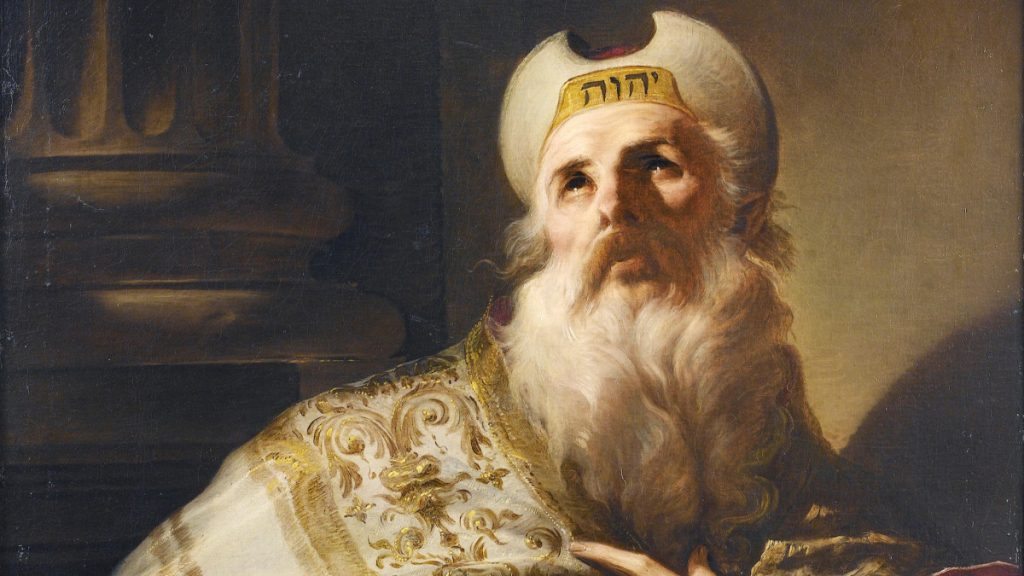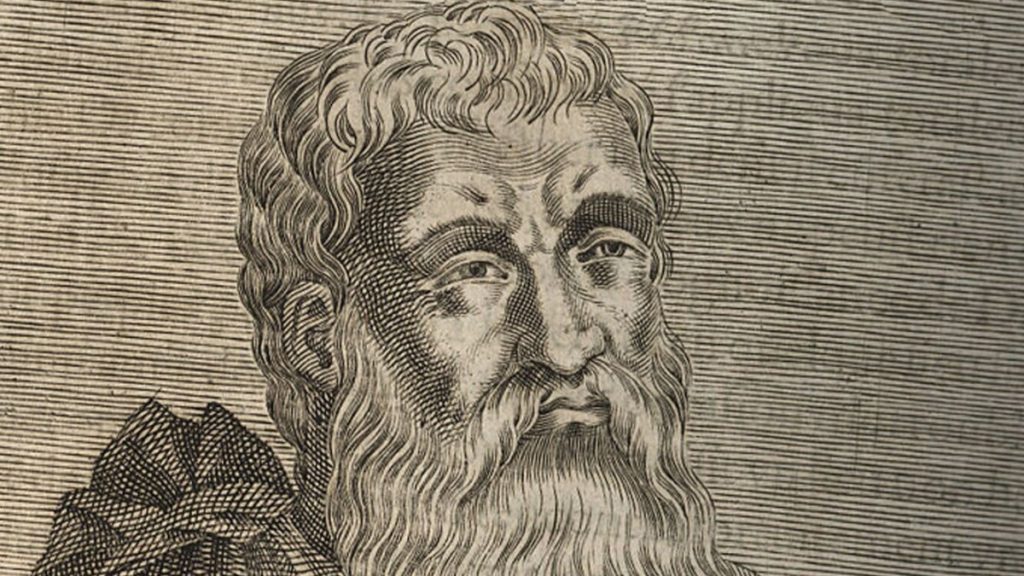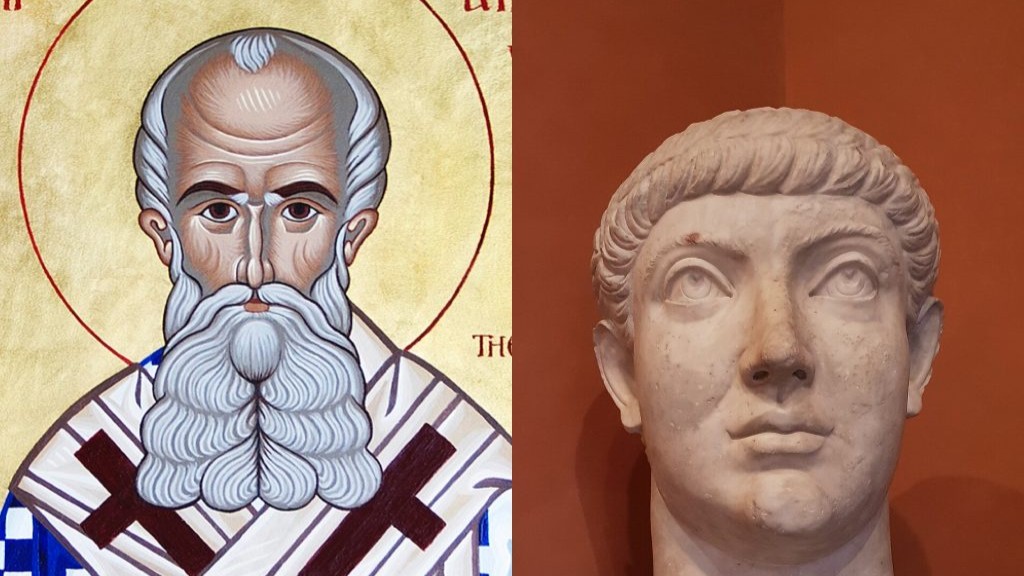(Updated July 17, 2025)
This Quote Archive is on Development of Doctrine. Each Archive is a treasury of original source quotes on various topics relevant to the Catholic Faith, and addressed in Becoming Catholic articles. They are intended to help people explore the “gold, silver, and precious gems” that have been mined and sifted from the sources of the Great Tradition by Eternal Christendom as a labor of love for our readers, and all seekers of Truth. They are periodically updated as more research is completed.
St. Clement of Alexandria (c. 150-c. 215) | EAST
St. Clement of Alexandria, The Stromata, or Miscellanies (c. 207)
Further, it is said that it is on account of “those that are approved that heresies exist” (1 Cor. 11:19). [The apostle] calls “approved,” either those who in reaching faith apply to the teaching of the Lord with some discrimination (as those are called skillful [δοκίμους, same word as above translated “approved”] money-changers, who distinguish the spurious coin from the genuine by the false stamp), or those who have already become approved both in life and knowledge.
For this reason, then, we require greater attention and consideration in order to investigate how precisely we ought to live, and what is the true piety. For it is plain that, from the very reason that truth is difficult and arduous of attainment, questions arise from which spring the heresies, savoring of self-love and vanity, of those who have not learned or apprehended truly, but only caught up a mere conceit of knowledge. With the greater care, therefore, are we to examine the real truth, which alone has for its object the true God. And the toil is followed by sweet discovery and reminiscence.
On account of the heresies, therefore, the toil of discovery must be undertaken; but we must not at all abandon [the truth]. For, on fruit being set before us, some real and ripe, and some made of wax, as like the real as possible, we are not to abstain from both on account of the resemblance. But by the exercise of the apprehension of contemplation, and by reasoning of the most decisive character, we must distinguish the true from the seeming.
And as, while there is one royal highway, there are many others, some leading to a precipice, some to a rushing river or to a deep sea, no one will shrink from traveling by reason of the diversity, but will make use of the safe, and royal, and frequented way; so, though some say this, some that, concerning the truth, we must not abandon it; but must seek out the most accurate knowledge respecting it. Since also among garden-grown vegetables weeds also spring up, are the husbandmen, then, to desist from gardening?
Having then from nature abundant means for examining the statements made, we ought to discover the sequence of the truth. Wherefore also we are rightly condemned, if we do not assent to what we ought to obey, and do not distinguish what is hostile, and unseemly, and unnatural, and false, from what is true, consistent, and seemly, and according to nature. And these means must be employed in order to attain to the knowledge of the real truth.
This pretext is then, in the case of the Greeks, futile; for those who are willing may find the truth. But in the case of those who adduce unreasonable excuses, their condemnation is unanswerable. For whether do they deny or admit that there is such a thing as demonstration? I am of opinion that all will make the admission, except those who take away the senses. There being demonstration, then, it is necessary to condescend to questions, and to ascertain by way of demonstration by the Scriptures themselves how the heresies failed, and how in the truth alone and in the ancient Church is both the most exact knowledge, and the truly best set of principles (αἴρεσις).
Origen (c. 184-c. 253) | EAST
Origen, On First Principles, or De Principiis (c. 225)
(§2) Since many, however, of those who profess to believe in Christ differ from each other, not only in small and trifling matters, but also on subjects of the highest importance, as, e.g., regarding God, or the Lord Jesus Christ, or the Holy Spirit; and not only regarding these, but also regarding others which are created existences, viz., the powers and the holy virtues; it seems on that account necessary first of all to fix a definite limit and to lay down an unmistakable rule regarding each one of these, and then to pass to the investigation of other points. For as we ceased to seek for truth (notwithstanding the professions of many among Greeks and Barbarians to make it known) among all who claimed it for erroneous opinions, after we had come to believe that Christ was the Son of God, and were persuaded that we must learn it from Himself; so, seeing there are many who think they hold the opinions of Christ, and yet some of these think differently from their predecessors, yet as the teaching of the Church, transmitted in orderly succession from the apostles, and remaining in the Churches to the present day, is still preserved, that alone is to be accepted as truth which differs in no respect from ecclesiastical and apostolic tradition.
(§3) Now it ought to be known that the holy apostles, in preaching the faith of Christ, delivered themselves with the utmost clearness on certain points which they believed to be necessary to everyone, even to those who seemed somewhat dull in the investigation of divine knowledge; leaving, however, the grounds of their statements to be examined into by those who should deserve the excellent gifts of the Spirit, and who, especially by means of the Holy Spirit Himself, should obtain the gift of language, of wisdom, and of knowledge; while on other subjects they merely stated the fact that things were so, keeping silence as to the manner or origin of their existence; clearly in order that the more zealous of their successors, who should be lovers of wisdom, might have a subject of exercise on which to display the fruit of their talents—those persons, I mean, who should prepare themselves to be fit and worthy receivers of wisdom.
St. Athanasius (c. 296/98-373) | EAST
St. Athanasius, De Decretis: Defense of the Nicene Definition (c. 350-56)
(§19) The Council wishing to do away with the irreligious phrases of the Arians, and to use instead the acknowledged words of the Scriptures, that the Son is not from nothing but “from God,” and is “Word” and “Wisdom,” and not creature or work, but a proper offspring from the Father, Eusebius and his fellows, led by their inveterate heterodoxy, understood the phrase “from God” as belonging to us, as if in respect to it the Word of God differed nothing from us, and that because it is written, “There is one God, from whom, all things” (1 Cor. 8:6); and again, “Old things are passed away, behold, all things are become new, and all things are from God” (2 Cor. 5:17). But the Fathers, perceiving their craft and the cunning of their irreligion, were forced to express more distinctly the sense of the words “from God.” Accordingly, they wrote “from the essence of God,” in order that “from God” might not be considered common and equal in the Son and in things originate, but that all others might be acknowledged as creatures, and the Word alone as from the Father…For neither are other things as the Son, nor is the Word one among others, for He is Lord and Framer of all; and on this account did the Holy Council declare expressly that He was of the essence of the Father, that we might believe the Word to be other than the nature of things originate, being alone truly from God; and that no subterfuge should be left open to the irreligious. This then was the reason why the Council wrote “of the essence.”
(§20) Again, when the Bishops said that the Word must be described as the True Power and Image of the Father, in all things exact and like the Father, and as unalterable, and as always, and as in Him without division (for never was the Word not, but He was always, existing everlastingly with the Father, as the radiance of light), Eusebius and his fellows endured indeed, as not daring to contradict, being put to shame by the arguments which were urged against them; but withal they were caught whispering to each other and winking with their eyes, that “like,” and “always,” and “power,” and “in Him,” were, as before, common to us and the Son, and that it was no difficulty to agree to these…But the Bishops discerning in this too their dissimulation, and whereas it is written, “Deceit is in the heart of the irreligious that imagine evil” (Prov. 12:20), were again compelled on their part to collect the sense of the Scriptures, and to re-say and re-write what they had said before, more distinctly still, namely, that the Son is “one in essence” with the Father: by way of signifying, that the Son was from the Father, and not merely like, but the same in likeness, and of showing that the Son’s likeness and unalterableness was different from such copy of the same as is ascribed to us, which we acquire from virtue on the ground of observance of the commandments.
St. Basil (330-379) | EAST
St. Basil, Letter 140: To the Church at Antioch (373)1
We believe these truths [in the Nicene Creed]. But, since the doctrine concerning the Holy Spirit was undefined, as at that time the Pneumatomachi [heretics of a sect founded by Macedonius] had not yet appeared, they [the Fathers of Nicaea] were silent as to the necessity of anathematizing those who say that the Holy Spirit is of a created and servile nature. For, absolutely nothing of the Divine and Blessed Trinity is created.
St. Basil, Letter 159: To Eupaterius and His Daughter (373)2
Since the question which has at present arisen among those who are always attempting to make innovations [heretics], but which had been passed over in silence by the men of earlier times [i.e. the Fathers of Nicaea] because the doctrine was not contradicted, has been left unexplained (I mean, of course, that concerning the Holy Spirit), we are adding the explanation of it in conformity with the meaning of the Scriptures…
St. Gregory of Nyssa (c. 335-395) | EAST
St. Gregory of Nyssa, Against Eunomius (c. 364-65)
And yet if those had been the more appropriate names, the Truth Himself would not have been at a loss to discover them, nor those men either, on whom successively devolved the preaching of the mystery, whether they were from the first eye-witnesses and ministers of the Word, or, as successors to these, filled the whole world with the Evangelical doctrines, and again at various periods after this defined in a common assembly the ambiguities raised about the doctrine; whose traditions are constantly preserved in writing in the churches. If those had been the appropriate terms, they would not have mentioned, as they did, Father, Son, and Holy Ghost, granting indeed it were pious or safe to remodel at all, with a view to this innovation, the terms of the faith; or else they [the successors of the Apostles] were all ignorant men and uninstructed in the mysteries, and unacquainted with what he [Eunomius, the heretic] calls the appropriate names—those men who had really neither the knowledge nor the desire to give the preference to their own conceptions over what had been handed down to us by the voice of God.
St. Gregory of Nyssa, Catechetical Discourse
(Part 2, Ch. 3, §§2-3)3
(§2) For in hypostasis the Spirit is one thing and the Word another, and another again is he to whom the Word and the Spirit belong. But whenever you understand the distinction in these, again, the unity of nature does not admit partition, so that neither is the might of the monarchy split, being cut up into differing divinities, nor does the discourse agree with Jewish teaching, but the truth passes through the mean of the two suppositions, casting down each of the heresies and accepting what is useful from each. For the teaching of the Jew is overturned both by the acceptance of the Word and by faith in the Spirit, while the Hellenists’ polytheistic error is destroyed, the unity of nature abolishing the fantasy of multiplicity.
(§3) And again, once more, from the Jewish supposition let the unity of the nature remain, and from Hellenism only the distinction of hypostases, each correspondingly healing the other’s impious conjecture: for just as the number of the Trinity is a healing for those in error about the one [nature], the principle of unity [is a healing] for those [whose thought is] scattered in a multitude [of gods].
St. Augustine (354-430) | WEST
St. Augustine, Of True Religion (390)
It has been truly said: “There must be many heresies, that they which are approved may be made manifest among you” (1 Cor. 11:19). Let us also make use of that gift of divine providence. Men become heretics who would have no less held wrong opinions even within the Church. Now that they are outside they do us more good, not by teaching the truth, for they do not know it, but by provoking carnal Catholics to seek the truth and spiritual Catholics to expound it. There are in the Holy Church innumerable men approved by God, but they do not become manifest among us so long as we are delighted with the darkness of our ignorance, and prefer to sleep rather than to behold the light of truth. So, many are awakened from sleep by the heretics, so that they may see God’s light and be glad. Let us therefore use even heretics, not to approve their errors, but to assert the Catholic discipline against their wiles, and to become more vigilant and cautious, even if we cannot recall them to salvation.
St. Augustine, City of God (c. 413-26)
The things which then were hidden are now sufficiently revealed by the actual events which have followed. For who can carefully and intelligently consider these things without recognizing them accomplished in Christ?…And Ham (i.e., hot), who was the middle son of Noah, and, as it were, separated himself from both [Shem and Japheth], and remained between them, neither belonging to the first-fruits of Israel nor to the fullness of the Gentiles, what does he signify but the tribe of heretics, hot with the spirit, not of patience, but of impatience, with which the breasts of heretics are wont to blaze, and with which they disturb the peace of the saints? But even the heretics yield an advantage to those that make proficiency, according to the apostle’s saying, “There must also be heresies, that they which are approved may be made manifest among you” (1 Cor. 11:19). Whence, too, it is elsewhere said, “The son that receives instruction will be wise, and he uses the foolish as his servant” (Prov. 17:2). For while the hot restlessness of heretics stirs questions about many articles of the Catholic faith, the necessity of defending them forces us both to investigate them more accurately, to understand them more clearly, and to proclaim them more earnestly; and the question mooted by an adversary becomes the occasion of instruction…
These secrets of divine Scripture we investigate as well as we can. All will not accept our interpretation with equal confidence, but all hold it certain that these things were neither done nor recorded without some foreshadowing of future events, and that they are to be referred only to Christ and His church, which is the city of God, proclaimed from the very beginning of human history by figures which we now see everywhere accomplished…
St. Augustine, Exposition of Psalm 7
But since he has said that the Lord has prepared not arrows only, but “instruments of death” too, in the bow, it may be asked, what are instruments of death? Are they, per-adventure, heretics? For they too, out of the same bow, that is, out of the same Scriptures, light upon souls not to be inflamed with love but destroyed with poison, which does not happen but after their deserts: wherefore even this dispensation is to be assigned to the Divine Providence, not that it makes men sinners, but that it orders them after they have sinned. For through sin reaching them with an ill purpose, they are forced to understand them ill, that this should be itself the punishment of sin: by whose death, nevertheless, the sons of the Catholic Church are, as it were by certain thorns, so to say, aroused from slumber, and make progress toward the understanding of the holy Scriptures. “For there must be also heresies, that they which are approved,” he says, “may be made manifest among you” (1 Cor. 11:19), that is, among men, seeing they are manifest to God. Or has He haply ordained the same arrows to be at once instruments of death for the destruction of unbelievers, and wrought them burning, or for the burning, for the exercising of the faithful? For that is not false that the Apostle says, “To the one we are the savor of life unto life, to the other the savor of death unto death; and who is sufficient for these things?” (2 Cor. 2:16). It is no wonder then if the same Apostles be both instruments of death in those from whom they suffered persecution, and fiery arrows to inflame the hearts of believers.
St. Augustine, Exposition of Psalm 55
(§21) “And His heart has drawn near” (v. 22). Of whom do we understand it, except of Him, by the anger of whom they have been divided? How “has his heart drawn near”? In such sort, that we may understand His will. For by heretics have been vindicated the Catholic Church, and by those that think evil have been proved those that think well. For many things lay hid in the Scriptures: and when heretics had been cut off, with questions they troubled the Church of God: then those things were opened which lay hid, and the will of God was understood. Thence is said in another Psalm, “In order that they might be excluded that have been proved with silver” (Ps. 68:30). For let them be excluded, He has said, let them come forth, let them appear. Whence even in silver-working men are called “excluders,” that is, pressers out of form from the sort of confusion of the lump. Therefore many men that could understand and expound the Scriptures very excellently, were hidden among the people of God: but they did not declare the solution of difficult questions, when no reviler again urged them. For was the Trinity perfectly treated of before the Arians snarled thereat? Was repentance perfectly treated of before the Novatians opposed? So not perfectly of Baptism was it treated, before re-baptizers removed outside contradicted; nor of the very oneness of Christ were the doctrines clearly stated which have been stated, save after that this separation began to press upon the weak: in order that they that knew how to treat of and solve these questions (lest the weak should perish vexed with the questions of the ungodly), by their discourses and disputations should bring out unto open day the dark things of the Law…This obscure sense see in what manner the Apostle brings out into light: “It is needful,” he says, “that also heresies there be, in order that men proved may be made manifest among you” (1 Cor. 11:19). What is “men proved”? Proved with silver, proved with the word. What is “may be made manifest”? May be brought out. Wherefore this? Because of heretics. So therefore these also “have been divided because of the anger of His countenance, and His heart has drawn near.”
(§22) “His discourses have been softened above oil, and themselves are darts” (v. 21). For certain things in the Scriptures were seeming hard, while they were obscure; when explained, they have been softened. For even the first heresy in the disciples of Christ, as it were from the hardness of His discourse arose. For when He said, “Except a man shall have eaten My flesh and shall have drunk My blood, he shall not have life in himself,” they, not understanding, said to one another, “Hard is this discourse, who can hear it?” Saying that, “Hard is this discourse,” they separated from Him: He remained with the others, the twelve. When they had intimated to Him, that by His discourse they had been scandalized, “Will you also,” He says, “choose to go?” Then Peter: “You have the Word of life eternal: to whom shall we go?” (John 6:53). Attend, we beseech you, and you little ones learn godliness. Did Peter by any means at that time understand the secret of that discourse of the Lord? Not yet he understood: but that good were the words which he understood not, godly he believed. Therefore if hard is a discourse, and not yet is understood, be it hard to an ungodly man, but to you be it by godliness softened: for whenever it is solved, it both will become for thee oil, and even unto the bones it will penetrate.
St. Augustine, Sermon 1 (51): On the Agreement of Matthew and Luke on the Generations of the Lord
What then do our adversaries say? If, says one, I shall discover a lie, surely you will not then believe it all; and such I have discovered. Let us see: I will reckon up the generations; for by their slanderous caviling they invite and bring us to this. Yes, if we live religiously, if we believe Christ, if we do not desire to fly out of the nest before the time, they only bring us to this—to the knowledge of mysteries. Mark then, holy brethren, the usefulness of heretics; their usefulness, that is, in respect of the designs of God, who makes a good use even of those that are bad; whereas, as regards themselves, the fruit of their own designs is rendered to them, and not that good which God brings out of them. Just as in the case of Judas; what great good did he! By the Lord’s Passion all nations are saved; but that the Lord might suffer, Judas betrayed Him. God then both delivers the nations by the Passion of His Son, and punishes Judas for his own wickedness. For the mysteries which lie hid in Scripture, no one who is content with the simplicity of the faith would curiously sift them, and therefore as no one would sift them, no one would discover them but for cavilers who force us. For when heretics cavil, the little ones are disturbed; when disturbed, they make search, and their search is, so to say, that they may yield as much milk as is sufficient for these little ones. They search then, because they are troubled; but they who know and have learned these things, because they have investigated them, and God has opened to their knocking, they in their turn open to those who are in trouble. And so it happens that heretics serve usefully for the discovery of the truth, while they cavil to seduce men into error. For with less carefulness would truth be sought out, if it had not lying adversaries; “For there must be also heresies among you,” and as though we should inquire the cause, he [St. Paul] immediately subjoined, “that they which are approved may be made manifest among you” (1 Cor. 11:19).
St. Augustine, Confessions (c. 397-400)
But somewhat later it was, I confess, that I learned how in the sentence, “The Word was made flesh” (John 1:15), the Catholic truth can be distinguished from the falsehood of Photinus. For the disapproval of heretics makes the tenets of Your Church and sound doctrine to stand out boldly. For there must be also heresies, that the approved may be made manifest among the weak [1 Cor. 11:19].
St. Augustine, Tractate 36 on the Gospel of John
Many heretics abound; and God has permitted them to abound to this end, that we may not be always nourished with milk and remain in senseless infancy. For inasmuch as they have not understood how the divinity of Christ is set forth to our acceptance, they have concluded according to their will: and by not discerning aright, they have brought in most troublesome questions upon catholic believers; and the hearts of believers began to be disturbed and to waver. Then immediately it became a necessity for spiritual men, who had not only read in the Gospel anything respecting the divinity of our Lord Jesus Christ, but had also understood it, to bring forth the armor of Christ against the armor of the devil, and with all their might to fight in most open conflict for the divinity of Christ against false and deceitful teachers; lest, while they were silent, others might perish. For whoever have thought either that our Lord Jesus Christ is of another substance than the Father is, or that there is only Christ, so that the same is Father, Son, and Holy Spirit; whoever also have chosen to think that He was only man, not God made man, or God in such wise as to be mutable in His Godhead, or God in such wise as not to be man; these have made shipwreck from the faith, and have been cast forth from the harbor of the Church, lest by their inquietude they might wreck the ships in their company. Which thing obliged that even we, though least and as regards ourselves wholly unworthy, but in regard of His mercy set in some account among His stewards, should speak to you what either you may understand and rejoice with me, or, if you cannot yet understand, by believing it you may remain secure in the harbor.
St. Augustine, On Baptism, Against the Donatists (400)
Cease, then, to bring forward against us the authority of Cyprian in favor of repeating baptism, but cling with us to the example of Cyprian for the preservation of unity. For this question of baptism had not been as yet completely worked out, but yet the Church observed the most wholesome custom of correcting what was wrong, not repeating what was already given, even in the case of schismatics and heretics; she healed the wounded part, but did not meddle with what was whole. And this custom, coming, I suppose, from apostolical tradition (like many other things which are held to have been handed down under their actual sanction, because they are preserved throughout the whole Church, though they are not found either in their letters, or in the Councils of their successors)—this most wholesome custom, I say, according to the holy Cyprian, began to be what is called amended by his predecessor Agrippinus [who ruled in favor of rebaptism, the incorrect position]. But, according to the teaching which springs from a more careful investigation into the truth, which, after great doubt and fluctuation, was brought at last to the decision of a plenary Council, we ought to believe that it rather began to be corrupted than to receive correction at the hands of Agrippinus.
There was at one time a doubt upon the subject of baptism; those who held different opinions yet remained in unity. In course of time, owing to the certain discovery of the truth, that doubt was taken away. The question which, unsolved, did not frighten Cyprian into separation from the Church, invites you, now that it is solved, to return once more within the fold. Come to the Catholic Church in its agreement, which Cyprian did not desert while yet disturbed with doubt; or if now you are dissatisfied with the example of Cyprian, who held communion with those who were received with the baptism of heretics, declaring openly that we should “neither judge any one, nor deprive any one of the right of communion if he differ from us,” where are you going, you wretched men? What are you doing? You are bound to fly even from yourselves, because you have advanced beyond the position where he abode. But if neither his own sins nor those of others could stand in his way, on account of the abundance of his charity and his love of brotherly kindness and the bond of peace, do you return to us, where you will find much less hindrance in the way of either us or you from the fictions which your party have invented.
St. Augustine, Letter 137: To Volusianus (412)
Heresies bud forth against the name of Christ, though veiling themselves under His name, as had been foretold, by which the doctrine of the holy religion is tested and developed. All these things are now seen to be accomplished, in exact fulfillment of the predictions which we read in Scripture; and from these important and numerous instances of fulfilled prophecy, the fulfillment of the predictions which remain is confidently expected…
St. Augustine, Letter 194: To St. Pope Sixtus (418)4
If you [St. Pope Sixtus] hear that they have thought up other attacks on the Catholic faith, and if you develop any arguments against them, lest they lay waste the weak members of the Lord’s flock, in your faithful and truly pastoral charity share them with us. Thus our own effort is roused from slothful sleep by the restlessness of heretics, forcing us to examine the Scriptures more carefully, lest they use them to harm the flock of Christ. And so, by the manifold grace of the Savior, God turns to our help what the enemy plots for our destruction, because “to them that love God all things work together unto good” (Rom. 8:28).
St. Cyril of Alexandria (c. 376-444) | EAST
St. Cyril of Alexandria, Letter 10: To a Certain Devotee of Nestorius
(§§1, 7)5
(§1) Then, looking forward to his own objective, he [a heretic] said to me, “He himself also said that the holy council [Nicaea] did not mention the expression; I mean, Mother of God.” But I had written that even if the council did not mention the expression, it had acted rightly, for at that time no such question had been raised. Wherefore it was not necessary to bring forward matters which were not being questioned, particularly if the synod recognized by the meaning of the terms the Holy Virgin to be the Mother of God…Therefore, they who say such things are deceiving and beguiling themselves, because 55 | 56 they are mistaken and have their own poison in their hearts… 56 | 57
(§7) …It happens that the “economy” of the Savior gathers a synod because of small and very slight matters in order to purify his church who keeps the true faith stainless and unconfused.
St. Vincent of Lérins (died c. 445) | WEST
St. Vincent of Lérins, Commonitory: For the Antiquity and Universality of the Catholic Faith Against the Profane Novelties of All Heresies (c. 434)
(§§48, 54-59)
(§48) This being the case, he is the true and genuine Catholic who loves the truth of God, who loves the Church, who loves the Body of Christ, who esteems divine religion and the Catholic Faith above everything, above the authority, above the regard, above the genius, above the eloquence, above the philosophy, of every man whatsoever; who sets light by all of these, and continuing steadfast and established in the faith, resolves that he will believe that, and that only, which he is sure the Catholic Church has held universally and from ancient time; but that whatsoever new and unheard-of doctrine he shall find to have been furtively introduced by some one or another, besides that of all, or contrary to that of all the saints, this, he will understand, does not pertain to religion, but is permitted as a trial, being instructed especially by the words of the blessed Apostle Paul, who writes thus in his first Epistle to the Corinthians, “There must needs be heresies, that they who are approved may be made manifest among you” (1 Cor. 11:19), as though he should say, “This is the reason why the authors of Heresies are not immediately rooted up by God, namely, that they who are approved may be made manifest; that is, that it may be apparent of each individual, how tenacious and faithful and steadfast he is in his love of the Catholic faith.”…
(§54) But someone will say, perhaps, Shall there, then, be no progress in Christ’s Church? Certainly; all possible progress. For what being is there, so envious of men, so full of hatred to God, who would seek to forbid it? Yet on condition that it be real progress, not alteration of the faith. For progress requires that the subject be enlarged in itself, alteration, that it be transformed into something else. The intelligence, then, the knowledge, the wisdom, as well of individuals as of all, as well of one man as of the whole Church, ought, in the course of ages and centuries, to increase and make much and vigorous progress; but yet only in its own kind; that is to say, in the same doctrine, in the same sense, and in the same meaning.
(§55) The growth of religion in the soul must be analogous to the growth of the body, which, though in process of years it is developed and attains its full size, yet remains still the same. There is a wide difference between the flower of youth and the maturity of age; yet they who were once young are still the same now that they have become old, insomuch that though the stature and outward form of the individual are changed, yet his nature is one and the same, his person is one and the same. An infant’s limbs are small, a young man’s large, yet the infant and the young man are the same. Men when full grown have the same number of joints that they had when children; and if there be any to which maturer age has given birth these were already present in embryo, so that nothing new is produced in them when old which was not already latent in them when children. This, then, is undoubtedly the true and legitimate rule of progress, this the established and most beautiful order of growth, that mature age ever develops in the man those parts and forms which the wisdom of the Creator had already framed beforehand in the infant. Whereas, if the human form were changed into some shape belonging to another kind, or at any rate, if the number of its limbs were increased or diminished, the result would be that the whole body would become either a wreck or a monster, or, at the least, would be impaired and enfeebled.
(§56) In like manner, it behooves Christian doctrine to follow the same laws of progress, so as to be consolidated by years, enlarged by time, refined by age, and yet, withal, to continue uncorrupt and unadulterate, complete and perfect in all the measurement of its parts, and, so to speak, in all its proper members and senses, admitting no change, no waste of its distinctive property, no variation in its limits.
(§57) For example: Our forefathers in the old time sowed wheat in the Church’s field. It would be most unmeet and iniquitous if we, their descendants, instead of the genuine truth of corn, should reap the counterfeit error of tares. This rather should be the result—there should be no discrepancy between the first and the last. From doctrine which was sown as wheat, we should reap, in the increase, doctrine of the same kind—wheat also; so that when in process of time any of the original seed is developed, and now flourishes under cultivation, no change may ensue in the character of the plant. There may supervene shape, form, variation in outward appearance, but the nature of each kind must remain the same. God forbid that those rose-beds of Catholic interpretation should be converted into thorns and thistles. God forbid that in that spiritual paradise from plants of cinnamon and balsam, darnel and wolfsbane should of a sudden shoot forth.
Therefore, whatever has been sown by the fidelity of the Fathers in this husbandry of God’s Church, the same ought to be cultivated and taken care of by the industry of their children, the same ought to flourish and ripen, the same ought to advance and go forward to perfection. For it is right that those ancient doctrines of heavenly philosophy should, as time goes on, be cared for, smoothed, polished; but not that they should be changed, not that they should be maimed, not that they should be mutilated. They may receive proof, illustration, definiteness; but they must retain withal their completeness, their integrity, their characteristic properties.
(§58) For if once this license of impious fraud be admitted, I dread to say in how great danger religion will be of being utterly destroyed and annihilated. For if any one part of Catholic truth be given up, another, and another, and another will thenceforward be given up as a matter of course, and the several individual portions having been rejected, what will follow in the end but the rejection of the whole? On the other hand, if what is new begins to be mingled with what is old, foreign with domestic, profane with sacred, the custom will of necessity creep on universally, till at last the Church will have nothing left untampered with, nothing unadulterated, nothing sound, nothing pure; but where formerly there was a sanctuary of chaste and undefiled truth, thenceforward there will be a brothel of impious and base errors. May God’s mercy avert this wickedness from the minds of his servants; be it rather the frenzy of the ungodly.
(§59) But the Church of Christ, the careful and watchful guardian of the doctrines deposited in her charge, never changes anything in them, never diminishes, never adds, does not cut off what is necessary, does not add what is superfluous, does not lose her own, does not appropriate what is another’s, but while dealing faithfully and judiciously with ancient doctrine, keeps this one object carefully in view—if there be anything which antiquity has left shapeless and rudimentary, to fashion and polish it; if anything already reduced to shape and developed, to consolidate and strengthen it; if any already ratified and defined, to keep and guard it. Finally, what other object have Councils ever aimed at in their decrees, than to provide that what was before believed in simplicity should in future be believed intelligently, that what was before preached coldly should in future be preached earnestly, that what was before practiced negligently should thenceforward be practiced with double solicitude? This, I say, is what the Catholic Church, roused by the novelties of heretics, has accomplished by the decrees of her Councils—this, and nothing else—she has thenceforward consigned to posterity in writing what she had received from those of olden times only by tradition, comprising a great amount of matter in a few words, and often, for the better understanding, designating an old article of the faith by the characteristic of a new name.
St. Prosper of Aquitaine (c. 390-c. 455) | WEST
St. Prosper of Aquitaine, Answers to the Gauls
(Art. 13)6
Even as regards the errors which God allows to arise in the Church [from heretics], we should understand how His goodness turns them to our good, not of course by fostering them but by fostering through them the zeal of His sons for the search and preservation of the truth. That is what the Apostle says: “There must also be heresies, that that also who are approved may be made manifest among you” (1 Cor. 11:19).
Sozomen (c. 400-c. 450) | EAST
Sozomen, Ecclesiastical History (c. 440-43)
Although, as we have shown, religion was in a flourishing condition at this period, yet the churches were disturbed by sore contentions; for under the pretext of piety and of seeking the more perfect discovery of God, certain questions were agitated, which had not, till then, been examined.
Arius was the originator of these disputations. He was a presbyter of the church at Alexandria in Egypt, and was at first a zealous thinker about doctrine, and upheld the innovations of Melitius. Eventually, however, he abandoned this latter opinion, and was ordained deacon by Peter, bishop of Alexandria, who afterwards cast him out of the church, because when Peter anathematized the zealots of Melitius and rejected their baptism, Arius assailed him for these acts and could not be restrained in quietness. After the martyrdom of Peter, Arius asked forgiveness of Achillas, and was restored to his office as deacon, and afterwards elevated to the presbytery. Afterwards Alexander, also, held him in high repute, since he was a most expert logician; for it was said that he was not lacking in such knowledge. He fell into absurd discourses, so that he had the audacity to preach in the church what no one before him had ever suggested; namely, that the Son of God was made out of that which had no prior existence, that there was a period of time in which he existed not; that, as possessing free will, he was capable of vice and virtue, and that he was created and made: to these, many other similar assertions were added as he went forward into the arguments and the details of inquiry. Those who heard these doctrines advanced, blamed Alexander for not opposing the innovations at variance with doctrine. But this bishop deemed it more advisable to leave each party to the free discussion of doubtful topics, so that by persuasion rather than by force, they might cease from contention; hence he sat down as a judge with some of his clergy, and led both sides into a discussion. But it happened on this occasion, as is generally the case in a strife of words, that each party claimed the victory. Arius defended his assertions, but the others contended that the Son is consubstantial and co-eternal with the Father. The council was convened a second time, and the same points contested, but they came to no agreement amongst themselves. During the debate, Alexander seemed to incline first to one party and then to the other; finally, however, he declared himself in favor of those who affirmed that the Son was consubstantial and co-eternal with the Father, and he commanded Arius to receive this doctrine, and to reject his former opinions. Arius, however, would not be persuaded to compliance, and many of the bishops and clergy considered his statement of doctrine to be correct. Alexander, therefore, ejected him and the clergy who concurred with him in sentiment from the church. Those of the parish of Alexandria, who had embraced his opinions, were the presbyters Aithalas, Achillas, Carpones, Sarmates, and Arius, and the deacons Euzoius, Macarius, Julius, Menas, and Helladius.
Many of the people, likewise, sided with them: some, because they imagined their doctrines to be of God; others, as frequently happens in similar cases, because they believed them to have been ill-treated and unjustly excommunicated. Such being the state of affairs at Alexandria, the partisans of Arius, deeming it prudent to seek the favor of the bishops of other cities, sent legations to them; they sent a written statement of their doctrines to them, requesting them that, if they considered such sentiments to be of God, they would signify to Alexander that he ought not to molest them; but that if they disapproved of the doctrines, they should teach them what opinions were necessary to be held.
This precaution was of no little advantage to them; for their tenets became thus universally disseminated, and the questions they had started became matters of debate among all the bishops…
St. Caesarius of Arles (c. 468/470-542) | WEST
St. Caesarius of Arles, Sermon 110: St. Jerome on the Censers of Core and Dathan
(§1)7
If the doctrine of the Church were simple and not surrounded by the assertions of heretical doctrines from without, our faith could not appear so clear 144 | 145 and well-verified. However, due to the fact that the attack of objectors besets Catholic doctrine, our faith does not become paralyzed through inactivity, but is perfected by much exercise. For this reason, the Apostle used to say: “There must be factions, so that those who are approved may also be made manifest among you” (1 Cor. 11:19). In other words, the altar must be surrounded by the censers of heretics, so that the difference between the faithful and unbelievers may become certain and clear to everyone. When the faith of the Church begins to shine like gold and its preaching glitters to all that behold it like silver that has been tried by fire, then the words of heretics will be despised with greater shame and disgrace because of the worthlessness of their dull brass.
St. Pope Gregory the Great (c. 540-604) | WEST
St. Pope Gregory the Great, Moralia on Job (c. 578-95)
(Book 27, Ch. 8, §14)8
The stars of rain can also be understood as the holy apostles, about whom Jeremiah says to rejected Judea as follows: “The stars and the rain have been withheld, and the later rain has not fallen” (Jer. 3:3). The Lord then removed the stars for the rain and poured down rain to double a flood, because when he took the preaching apostles away from Judea, he irrigated the world with the teaching of new grace. That both of these acts happened in the church can be advantageously understood in that when the apostles’ bodies were done away with and their souls were removed to the secret bosom of heaven, it was as though God hid the stars of rain from the face of the sky. But when the stars of rain were 254 | 255 taken away, God sent rain like a flood, because with even the apostles removed to heaven, the flood of divine knowledge that long lay hidden was revealed with more abundant outpouring through the opened tongues of the followers of the apostles.
What the apostles, you see, spoke briefly, their followers in their expositions expanded and multiplied. So it is not without reason that the very preaching and exposition should be compared to a flood, because since they collect the words of their many predecessors, they themselves grow more profoundly by means of the words that they pass on. At the same time as they join testimony to testimony, it is as though they collected drops of water to make a flood. The Gentiles are daily taught with these words, and because the minds of sinners receive knowledge of heaven, it is as though the standing water on the ground exhibited floods. But these expositors never exhibit themselves as superior to the apostles in knowledge when they speak at length in their exposition. They ought, you see, always to remember through whom they have received the discoveries of their knowledge.
St. Pope Gregory the Great, Letter 2 (Book 8): To Anastasius, Bishop of Antioch Bishop of Antioch
Moreover, there is this by the great favor of Almighty God; that among those who are divided from the doctrine of Holy Church there is no unity, since every kingdom divided against itself shall not stand [Matt. 12:25; Mark 3:24; Luke 11:17]. And holy Church is always more thoroughly equipped in her teaching when assaulted by the questionings of heretics; so that what was said by the Psalmist concerning God against heretics is fulfilled, “They are divided from the wrath of his countenance, and his heart has drawn near” (Ps. 50:20-21). For while they are divided in their wicked error, God brings His heart near to us, because, being taught by contradictions, we more thoroughly learn to understand Him.
St. Isidore of Seville (c. 560-636) | WEST
St. Isidore of Seville, Sententiae (c. 612)
(Book 1, Ch. 16, §§5, 8)9
(§5) Because of the wickedness of heresy the Church has expanded the scope of its doctrines, for earlier it was flourishing only by a simple faith. Therefore because of the opportunity offered by the heretics, those learned in the faith have increased [cf. 1 Cor. 11:19], and through the acumen of the heresies, the teachers of the Church have grown in depth. For now the assertion of the truth is manifested more clearly whenever any dissension appears… 64 | 65
(§8) The reason for heresy is that this reality might come to be, that is, the strengthening of faith [cf. 1 Cor. 11:19]. The power of faith is shown, for example, through that which may be an obscurity of the divine Scriptures, in which the mistaken heretics understand something other than that which it really contains; the heresies are not able to survive, because by the very fact that they are heresies, they already are not. But thinking wrongly, they do not acquire the essence; they tend toward nothingness.
Footnotes
- St. Basil, Sister Agnes Clare Way, C.D.P., trans., The Fathers of the Church, Vol. 13: Letters, Vol. 1 (1-185) (Washington, DC: The Catholic University of America Press, 1951), 289. ↩︎
- St. Basil, Sister Agnes Clare Way, C.D.P., trans., The Fathers of the Church, Vol. 13: Letters, Vol. 1 (1-185) (Washington, DC: The Catholic University of America Press, 1951), 313. ↩︎
- St. Gregory of Nyssa, Ignatius Green, trans., Popular Patristics, Vol. 60: Saint Gregory of Nyssa, Catechetical Discourse, A Handbook for Catechists (Yonkers, NY: St. Vladimirʼs Seminary Press, 2019), 69. ↩︎
- St. Augustine, Sister Wilfrid Parsons, SND, trans., The Fathers of the Church, Vol. 30: Saint Augustine, Letters, Vol. IV (165-203) (Washington, DC: The Catholic University of America Press, 1955), 332. ↩︎
- St. Cyril of Alexandria, John I. McEnerney, The Fathers of the Church, Vol. 76: St. Cyril of Alexandria, Letters 1-50 (Washington, DC: The Catholic University of America Press, 1987), 55-56, 57. ↩︎
- St. Prosper of Aquitaine, P. de Letter, S.J., trans., Ancient Christian Writers, Vol. 32: Prosper of Aquitaine: Defense of St. Augustine (New York: Newman Press, 1963), 154. ↩︎
- St. Caesarius of Arles, Sister Mary Magdeleine Mueller, O.S.F., trans., The Fathers of the Church, Vol. 47: Saint Caesarius of Arles, Sermons, Vol. 2 (Washington, DC: The Catholic University of America Press, 1964), 144-45. ↩︎
- St. Pope Gregory the Great, Brian Kerns, OCSO, trans., Cistercian Studies, Vol. 260: Gregory the Great, Moral Reflections on the Book of Job, Volume 5, Books 23-27 (Athens, OH: Cistercian Publications, 2019), 254-55. ↩︎
- St. Isidore of Seville, Thomas L. Knoebel, trans., Ancient Christian Writers, Vol. 73: Isidore of Seville, Sententiae (New York: The Newman Press, 2018), 64, 65. ↩︎
